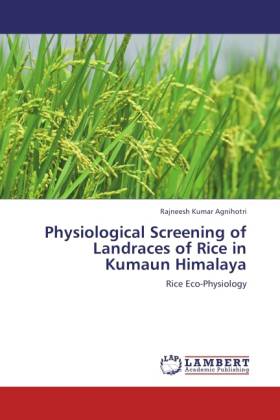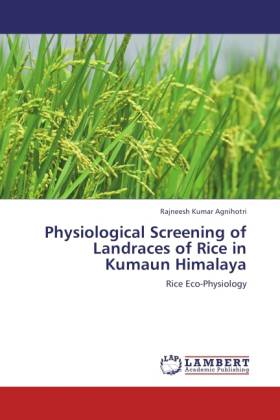
- Afhalen na 1 uur in een winkel met voorraad
- Gratis thuislevering in België vanaf € 30
- Ruim aanbod met 7 miljoen producten
- Afhalen na 1 uur in een winkel met voorraad
- Gratis thuislevering in België vanaf € 30
- Ruim aanbod met 7 miljoen producten
Zoeken
Physiological Screening of Landraces of Rice in Kumaun Himalaya
Rice Eco-Physiology
Rajneesh Kumar Agnihotri
Paperback | Engels
€ 77,95
+ 155 punten
Omschrijving
The present investigations on exploration and eco-physiological studies of landraces revealed that the remote locations in the mountains for from the impact of modernization still harbor several landraces to meet local demands. As in the rice, a number of landraces are under cultivation in the mountain even today whereas these were absent in the agriculture of plains; these are being maintained by the hill farmers to meet their specific needs and are part and parcel of their traditional crop management system. If serious view of the existing situation is not taken into account, the Himalaya will become a food-importing region and loose in terms of ecological and economical security. A national system needs to be put in place to ensure effective conservation, adequate duplication and proper documentation so that the substantial gene pool can be effectively utilized. In the long run, it would be realized that conservation could only be sustainable if our national policy, supporting facilities and financial resources are sustainable.
Specificaties
Betrokkenen
- Auteur(s):
- Uitgeverij:
Inhoud
- Aantal bladzijden:
- 212
- Taal:
- Engels
Eigenschappen
- Productcode (EAN):
- 9783845422510
- Verschijningsdatum:
- 25/08/2011
- Uitvoering:
- Paperback
- Formaat:
- Trade paperback (VS)
- Afmetingen:
- 152 mm x 229 mm
- Gewicht:
- 317 g

Alleen bij Standaard Boekhandel
+ 155 punten op je klantenkaart van Standaard Boekhandel
Beoordelingen
We publiceren alleen reviews die voldoen aan de voorwaarden voor reviews. Bekijk onze voorwaarden voor reviews.











